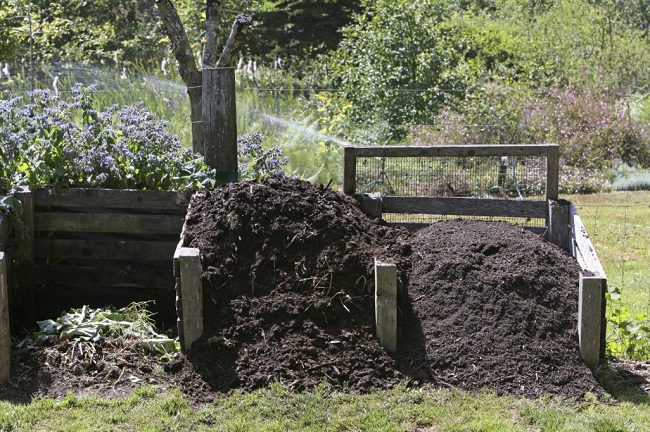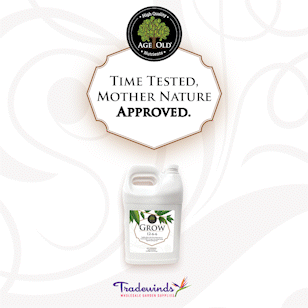
Composting is one of many organic gardening tasks that have become unnecessarily complicated. Composting is the cycle of plant life that Mother Nature conducts without our help. Trees and other plants shed organic matter including leaves, bark, branches, and fruits etc. The organic matter decomposes at different rates depending on its composition and on the climate. In addition, herbivores living and grazing in the area deposit droppings which accelerate and enrich the process. As this organic and fecal mater decomposes it is converted into rich humus.
The natural composting process goes on without our help, but when it comes to organic composting, what we are interested in doing is speeding up this process as much as possible. There are several components to the composting process that combine to help accomplish this goal.
Air and Water – Creating Proper Aerobic Conditions
The composting process depends on various bacteria and fungi to break down organic matter. These helpful organisms require an aerobic (with air) environment and consistent moisture to do their stuff. The following points will insure a well aerated and properly moistened environment.
Regardless of whether your composting pile is contained or consists of a mound of uncontained organic matter, start with a “bed” of small branches, or even construct a base out of wood and wire to help make sure the pile has good air circulation at the bottom. You can even assemble your pile on an old shipping pallet to facilitate this purpose. Or you can easily build a two or three bins composting system.
If the pile is assembled in a container, make the sides of some material like wire or mesh that can “breathe”. I like to use old shipping pallets to assemble a large compost box that can breathe on all sides. Shipping pallets can often be found for free on your local Craigslist internet classifieds “free” listings.
A compost pile will decompose regardless of whether you turn it or not, but to speed the process the pile should be turned with a garden fork every week or two. To do this, it helps to have room for two bins or piles. Start from the top and move the contents back and forth from one spot or bin to another each week. Make sure that each spot or bin has a breathable “bed” at the bottom and leave that when you turn the pile. I like to have four piles or bins next to each other. One is filled until full and then I turn that one into the next pile or bin each week until it reaches the fourth bin or pile. Additional organic matter is not added after the initial filling and instead is used to start the next pile in spot one. Once the pile reaches spot four it has greatly reduced in size. Once pile four is ¾ full, compost can be removed by forking from the bottom each time new matter is added to the pile.
There are some large-scale composting sites that have success with huge piles, but for garden composting it works best to keep the pile size manageable at around three to five feet wide and high. A pile smaller than this will also not produce the heat necessary to speed up the process.
You want your compost pile to remain moist but not soaked. You can test this by reaching into the pile and pulling out a handful of matter. Squeeze your sample and inspect it. If the sample is dripping wet or you can squeeze out substantial moisture, it is too wet. But you do want it to feel consistently moist. The microorganisms that do the decomposition work need moisture to survive, so you want to make sure your pile never completely dries out.
Composition of Your Pile – What to Add and How Much
- Never add meat or fecal matter from animals that eat meat to your compost pile.
- Generally, you want to alternate layers of green or moist matter with layers of brown or dry matter.
- Grass clippings are great for making compost but should be spread out to dry first. If not, they can become matted and create undesirable smells.
- Coffee grounds can be had for free at your neighborhood Starbucks and make a great addition to your compost. They are slightly acidic, but neutral after composting. Never add more than 25% of any one item to your compost pit including coffee grounds.
- Nonmeat kitchen scraps and spoiled produce and plant matter are good additions to your compost.
- Never add diseased plants to your compost. If possible, burn them and sprinkle the ashes around your garden.
- The finer organic matter is chopped the faster it will decompose. Do not add thick branches to your compost.
- Add a few layers of rich garden soil to your compost pile. This will help by acting as a catalyst for microbial activity.
- If your compost pile smells, it is generally too moist and/or too much green matter has been added. Add dry matter like leaves and cut back on watering the pile until the moisture content is reduced to the proper level.
Tips for Successful Composting
- It is fine if you don’t want to bother turning your compost pile, but it will take much longer for it to decompose.
- Assemble your pile in a spot where you intend to grow plants in the future. The leaching of nutrients while watering the pile will enrich the soil under the pile.
- Plant nitrogen loving plants like squash around the base or even on the top of a cold/slow compost pile that will not be turned.
- Consider adding a product called compost starter, or vermi or compost tea to the pile to help inoculate it with beneficial microbes.
- If you have limited access to organic matter, consider the following free sources:
- Free coffee grounds available from Starbucks
- Leftover pulp from juice shops
- Chipped content from tree companies. Many are willing to drop it off by the truckload rather than paying to take it to the dump.
- Ask neighbors who have lawns or their yard crews for the grass clippings.
- Offer to muck out someone’s horse stalls once a month for the manure.
- Buy a paper shredder and shred your newspaper each week.
Follow these tips and you will be well on your way to producing high quality compost for your garden.
John Berends is a free-lance writer and master gardener.
Related Articles & Free Email Newsletter Sign-Up
Be a Worm Farmer and Make Your Own Compost
How to Have Great Compost in 3 Months
How to Make Actively Aerated Compost Tea



Comment here